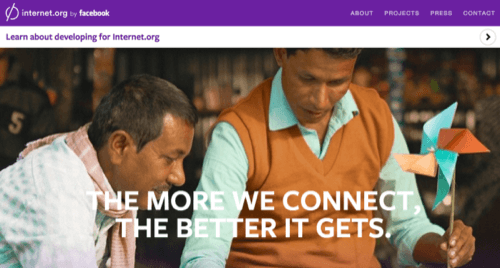There is no free lunch, goes the saying. As it turns out, there is no free Internet, either.
Facebook, to its credit, launched Internet.org to try to bring free Internet access to people in emerging economies who may not otherwise be able to afford it. Along the way, the company has made all sorts of compromises to ensure it can afford to offer the service, as ReadWrite reports.
See also: Facebook Opens Internet.org To Developers—Just Not Very Much
But one massive compromise has nothing to do with cost, and everything to do with Facebook’s business model: Users get Internet access in exchange for their personal data, more data than even Western consumers are used to giving.
Compromised Access
“Free” sounds great, but someone always has to pay for it. In the case of Internet.org, “free” equals mobile Internet access in India, Tanzania, Kenya, Colombia, Ghana, and Zambia, subsidized by Facebook.
But “free” also means a curated (read: limited) list of websites accessible through the service. Under pressure from a wave of complaints, Facebook recently expanded beyond the original 38 websites, to any site that agrees to comply with its rules (like no encrypted access).
While Facebook CEO Mark Zuckerberg has recently declared that HTTPS is “coming soon,” Internet.org still flies in the face of Facebook’s commitment to security and net neutrality.

But maybe that’s the price of “free.” Maybe there are, as Zuckerberg says, technical reasons that require this bottled up approach to the Internet. Sure, it’s anticompetitive, making Facebook arbiter of what Internet.org users are allowed to see, but maybe that’s the required trade-off.
Even so, that doesn’t explain other attributes of Internet.org that may spook even the most ardent admirer of free stuff.
All Your Data Are Belong To Us
In the Web world, we’re used to paying with our personal data, even if we don’t always understand the Faustian bargain. Google gives us free email; we let it advertise to us. Facebook, for its part, gives us access to the world’s largest social network; in turn, we give the company deep insight into our personal lives, which Facebook uses to sell advertising to us.
We may not like it, but it’s hard to imagine getting so much for free if we don’t pay with something.
But Internet.org takes this privacy auction much further.
As Nikhil Pahwa explains, using Internet.org gives Facebook, telcos, and governments first-class access to user data. According to the terms of service:
We collect information when you install, run or use any of our services, including the free websites and services provided through Internet.org.
And:
We may share information such as your phone number or data usage with your mobile operator so we can provide and improve our services, and to enable us and your operator to understand how you are using and interacting with Internet.org and the carrier’s products and services.
As Pahwa further shows, Internet.org developers must sign up to its Statement of Rights and Responsibilities, which clearly states that for content that is covered by Intellectual Property Rights, “you grant us a non-exclusive, transferable, sub-licensable, royalty-free, worldwide license to use any IP content that you post on or in connection with Facebook (IP License).”
While this could be argued to be a mere matter of necessity in delivering the walled-garden service, it is precisely how tightly the service (and content therein) is regulated by Facebook that should concern users.
Will Anyone Care?
Of course, users may not care. A limited Internet may be better than none at all, as Zuckerberg has argued.
But why are users forced into making this choice at all?
Facebook could, after all, simply subsidize the cost of a certain amount of access to a completely unfettered Internet. Many users would still choose to use Facebook, without being corralled into it.
It feels that Facebook is pushing users into a compromise that it could avoid. The deeper compromise, however, isn’t the near-term privacy concessions, but rather a generation raised on the idea that the Internet is more like Compuserve than the World Wide Web. The power of the Internet has been its openness.
The essential problem with Internet.org is its lack of openness. Facebook can do better.
Lead image courtesy of Internet.org
















